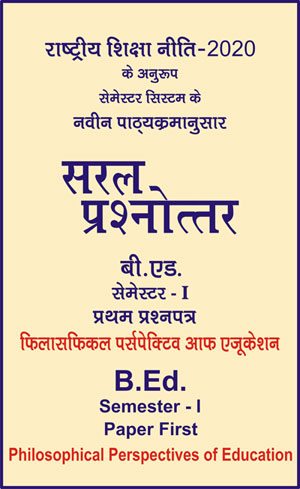|
बी एड - एम एड >> बी.एड. सेमेस्टर-1 प्रश्नपत्र-I - फिलासफिकल पर्सपेक्टिव आफ एजुकेशन बी.एड. सेमेस्टर-1 प्रश्नपत्र-I - फिलासफिकल पर्सपेक्टिव आफ एजुकेशनसरल प्रश्नोत्तर समूह
|
|
|||||||
बी.एड. सेमेस्टर-1 प्रश्नपत्र-I - फिलासफिकल पर्सपेक्टिव आफ एजुकेशन (अंग्रेजी भाषा में)
Question- Explain the Salient Features of Naturalism?
Answer -
Salient Features of Naturalism
-
Positivism: It means that the natural phenomena come within the scope of some or the other positive sciences and can be explained by means of scientific laws. In modern times, positivism was established by a French thinker August Comete.
-
Qualitative Difference: According to modern naturalism, there is not only quantitative but also qualitative differences at different levels of evolution and no new level can be explained by the laws applicable to the level preceding it.
-
Physicalism: Naturalism is also a type of physicalism. Therefore, there is no place for soul, God, or other world in it, nor does it believe in freedom of will, though some philosophers have tried to prove freedom of will as scientific on the basis of the refutation of determinism in the structure of atoms. Because of its being physicalism, naturalism has been the target of all the objections which have been leveled against physicalism.
-
Mechanism: Because naturalism supports science or is based on it, its form changes along with new discoveries in the different sciences. Therefore, some philosophers prefer to call their naturalistic philosophy by the name of mechanism. But the claim of mechanism to be universally applicable has also been rejected nowadays. According to naturalism, the natural laws are universal and necessary, and as such different natural laws occur mechanically without any purpose.
-
Naturalism in Education: In the history of philosophy of education, naturalism is also as old as idealism. The term naturalism, by its ordinary meaning, means the “ism” laying emphasis upon nature in every field of education. Thus, the naturalist philosopher derives the aims and ideals, the means, the methods of the teaching and the principles of curriculum and school management from the nature.
-
Philosophical Presuppositions:
In metaphysics, the ultimate reality, according to naturalism is the Nature and Nature is material. In epistemology, the naturalists are empiricists. They believe that knowledge is acquired through sense organs and with the help of the brain. They do not accept the rationalist’s position that all knowledge is innate. They, too, trust in the possibility of direct knowledge. Follow Nature is their slogan. -
Philosophical Forms of Naturalism:
(i) Naturalism of Physical World:
This principle seeks to explain human actions, individual experience, emotions, and feelings on the basis of physical sciences. It seeks to explain the entire universe in the light of the principles of physical sciences.
(ii) Mechanical Positivism:
According to this principle, the entire universe is a machine made of matter and is possessed of a self-driving energy that ensures its functioning. This is materialism, for it suggests that matter is the only reality, and anything that exists is a form of matter. The human being is conceived of as nothing more than an active machine which is activated by certain environmental influences.
(iii) Biological Naturalism:
It is naturalism in this form, which has had the greatest impact upon education. It has elaborated the theory of the natural man, and has explained that the evolution of man and animal is a single process. It refuses to admit the spiritual nature of man and expounds that his nature is the heritage he has received from his ancestors. -
Naturalist Educators: Naturalism, like other isms, started in ancient Greece and ancient India. Democritus (460 BC), Leucippus (793-57 BC), Thales (640-546 BC), Epicurus (341-270 BC) and Lucretius (96-55 BC) were prominent naturalists in ancient Greece. In ancient India, the philosopher Charvakas were naturalists. In the medieval period, no significant naturalists prospered since religion had a wide influence upon thinkers. From the sixteenth to eighteenth century, the most important naturalist thinkers were Rousseau (1712-1788), Bacon (1561-1626) and Hobbes (1588-1679). Herbert Spencer (1820-1903 AD) presented a naturalist philosophy of education in contemporary times.
|
|||||

 i
i 










